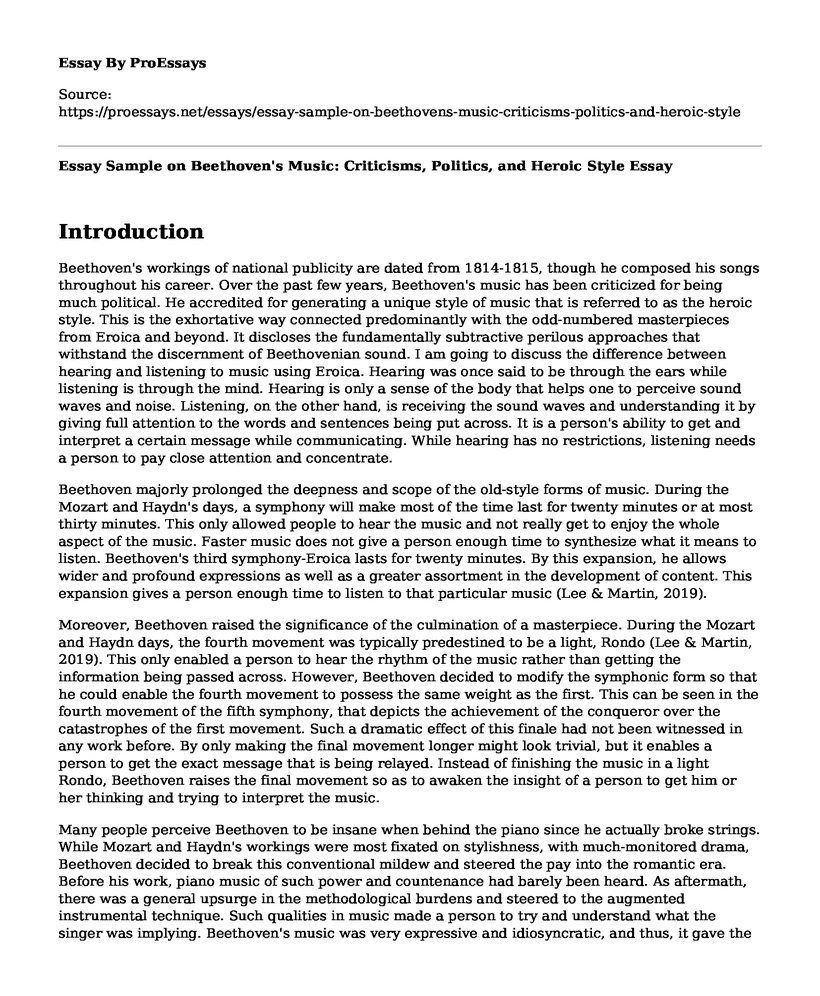Introduction
Beethoven's workings of national publicity are dated from 1814-1815, though he composed his songs throughout his career. Over the past few years, Beethoven's music has been criticized for being much political. He accredited for generating a unique style of music that is referred to as the heroic style. This is the exhortative way connected predominantly with the odd-numbered masterpieces from Eroica and beyond. It discloses the fundamentally subtractive perilous approaches that withstand the discernment of Beethovenian sound. I am going to discuss the difference between hearing and listening to music using Eroica. Hearing was once said to be through the ears while listening is through the mind. Hearing is only a sense of the body that helps one to perceive sound waves and noise. Listening, on the other hand, is receiving the sound waves and understanding it by giving full attention to the words and sentences being put across. It is a person's ability to get and interpret a certain message while communicating. While hearing has no restrictions, listening needs a person to pay close attention and concentrate.
Beethoven majorly prolonged the deepness and scope of the old-style forms of music. During the Mozart and Haydn's days, a symphony will make most of the time last for twenty minutes or at most thirty minutes. This only allowed people to hear the music and not really get to enjoy the whole aspect of the music. Faster music does not give a person enough time to synthesize what it means to listen. Beethoven's third symphony-Eroica lasts for twenty minutes. By this expansion, he allows wider and profound expressions as well as a greater assortment in the development of content. This expansion gives a person enough time to listen to that particular music (Lee & Martin, 2019).
Moreover, Beethoven raised the significance of the culmination of a masterpiece. During the Mozart and Haydn days, the fourth movement was typically predestined to be a light, Rondo (Lee & Martin, 2019). This only enabled a person to hear the rhythm of the music rather than getting the information being passed across. However, Beethoven decided to modify the symphonic form so that he could enable the fourth movement to possess the same weight as the first. This can be seen in the fourth movement of the fifth symphony, that depicts the achievement of the conqueror over the catastrophes of the first movement. Such a dramatic effect of this finale had not been witnessed in any work before. By only making the final movement longer might look trivial, but it enables a person to get the exact message that is being relayed. Instead of finishing the music in a light Rondo, Beethoven raises the final movement so as to awaken the insight of a person to get him or her thinking and trying to interpret the music.
Many people perceive Beethoven to be insane when behind the piano since he actually broke strings. While Mozart and Haydn's workings were most fixated on stylishness, with much-monitored drama, Beethoven decided to break this conventional mildew and steered the pay into the romantic era. Before his work, piano music of such power and countenance had barely been heard. As aftermath, there was a general upsurge in the methodological burdens and steered to the augmented instrumental technique. Such qualities in music made a person to try and understand what the singer was implying. Beethoven's music was very expressive and idiosyncratic, and thus, it gave the listener an insight to understand the music's message. From the analyses of Beethoven's Eroica, the perspective of listening is more evident than hearing. Many people who understood him better came to like his music.
References
Lee A. J & Martin F. D. (2019). Humanities through the arts (6th Ed.). New York, NY: McGraw-Hill
Cite this page
Essay Sample on Beethoven's Music: Criticisms, Politics, and Heroic Style. (2023, Jan 30). Retrieved from https://proessays.net/essays/essay-sample-on-beethovens-music-criticisms-politics-and-heroic-style
If you are the original author of this essay and no longer wish to have it published on the ProEssays website, please click below to request its removal:
- Effects of Instagram and Text Messaging on Relationships Essay
- Music Engineering Section Essay
- Genres of Writing Analysis Paper Example
- Lessons From Fashion's Free Culture Paper Example
- Exploring Hip Hop: An Ageless Art Form With Evolving Characteristics - Essay Sample
- Paper Example on Carl and Ellie's Life Journey: A Tale of Integrity and Love
- Movie Review Example on Camp Crip: A Revolution for People with Disabilities







